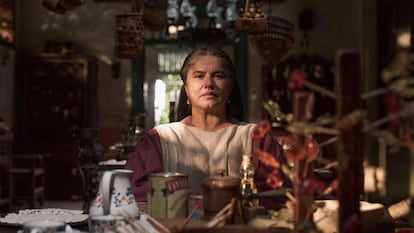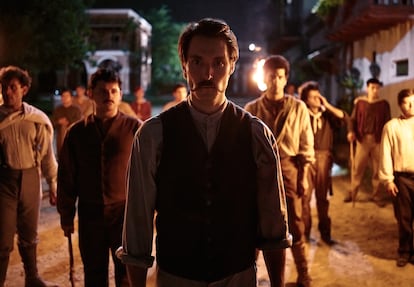In defense of ‘One Hundred Years of Solitude’: This Macondo and this Úrsula were worth it
The Netflix series has gotten mixed reviews as it inevitably falls short of the perfection of Gabriel García Márquez’s novel despite sticking closely to his prose

In one episode of Netflix’s One Hundred Years of Solitude, the newly arrived, government-appointed magistrate of Macondo calls the first elections. Apolinar Moscote then learns the result: “236 votes in total. 132 red ballots for the Liberal Party. And only 104 blue ballots for the Conservative Party.” Without missing a beat, Moscote replies: “Then let it be the other way around: 132 blue votes and 104 red ones.” He then takes the missing blue ballots out of a drawer before sealing the ballot box. The action is supposed to take place between the late 19th and early 20th centuries, but some things have not changed. Something similar happened recently, not in Colombia, but very nearby, in Nicolás Maduro’s Venezuela. That passage, unfortunately, is more realistic than magical, as are the scenes of endless wars. But there is also magic in the story: levitating people, ghosts, premonitions, alchemy, epidemics of insomnia, a stream of blood that presages death.
The adaptation of One Hundred Years of Solitude in two eight-episode seasons, the first of which is already available, has received mixed reviews, with EL PAÍS columnist Sergio del Molino declaring it “a horrendous series, an endless coffee advertisement.” Approaching it with low expectations may help in avoiding disappointment. Its detractors may feel vindicated by the fact that Gabriel García Márquez himself had always refused to have his best-known novel made into a film, although he admitted that it would make more sense as a 10-season series. The author believed it was better for readers to imagine the characters and not associate each name with the face of an actor: “I prefer that my readers continue to imagine my characters as their uncles and friends and not be totally conditioned by what they see on screen.” This has long made the novel be perceived as something untouchable by the film industry.
Does the series get close to being the masterpiece that the book is? No, of course not, nor should it aim to. Does it reflect the brilliance of Márquez’s seductive and almost musical prose? No, although the original is treated with such respect that the voice of a narrator reads us fragments, and that is the least cinematographic thing that happens in the series. Is the approach to the prose too cautious? Yes, because that is what the writer’s children agreed with directors Laura Mora and Alex García López. Would it have been possible to have strayed a little more from the novel, to find a director with a bigger name and more freedom to put his own stamp on it? Yes, but that was not the idea. There were two premises from the start: extreme faithfulness to the original, and a 100% Colombian production.
Given these conditions, the series does a good job. The recreation of that corner of the Colombian Caribbean is beautiful; it allows us to get attached to the characters — above all, Ursula Iguarán, the courageous and suffering mother who keeps the Buendía family going, played with maturity by Marleyda Soto. It does not avoid the most lurid aspects of the novel, such as incestuous relationships; it allows for a flow between the plausible and the implausible; and it captures the miseries of the country, while portraying the battle action admirably.

Does it oversimplify a complex and nuanced work? Sure, but that’s what we were counting on because that’s what TV is like. Can you watch the series without comparing it to the tremendous aesthetic experience of reading the book? It’s difficult, but not impossible. It is true that we are shown what the novel invites us to imagine with greater mastery. But this has been done hundreds of times with other great authors: the works of Cervantes, Shakespeare or Dickens, not to mention those of Jane Austen, have been adapted to the screen with mixed results and without so much trepidation. The fact that people now put the face of actor Fernando Rey to Don Quixote has done nothing to undermine the original work.
There is a handicap in One Hundred Years of Solitude that does affect the book. The so-called magical realism, which was so influential in the boom years of Latin American literature, but which is not so popular these days. With exceptions, the following generations of authors in the region sought their own language without resorting to showers of tiny yellow flowers. They opted for a dry, more minimalist style. And the authors who do embrace fantasy, particularly horror, do so today within that specific genre.
The fact that magic realism is no longer in fashion is perhaps an incentive to examine Márquez’s personal universe. Daring to shoot One Hundred Years of Solitude was reckless but worth it. You believe in its Macondo, you believe in its Ursula. It is perhaps overly faithful to the novel, but it is made with care. It is a different, defensible and honest approach which, while not perfect, does allow us to enjoy this beautiful and tragic story. It is the non-masterpiece that was waiting to get done.
Sign up for our weekly newsletter to get more English-language news coverage from EL PAÍS USA Edition
Tu suscripción se está usando en otro dispositivo
¿Quieres añadir otro usuario a tu suscripción?
Si continúas leyendo en este dispositivo, no se podrá leer en el otro.
FlechaTu suscripción se está usando en otro dispositivo y solo puedes acceder a EL PAÍS desde un dispositivo a la vez.
Si quieres compartir tu cuenta, cambia tu suscripción a la modalidad Premium, así podrás añadir otro usuario. Cada uno accederá con su propia cuenta de email, lo que os permitirá personalizar vuestra experiencia en EL PAÍS.
¿Tienes una suscripción de empresa? Accede aquí para contratar más cuentas.
En el caso de no saber quién está usando tu cuenta, te recomendamos cambiar tu contraseña aquí.
Si decides continuar compartiendo tu cuenta, este mensaje se mostrará en tu dispositivo y en el de la otra persona que está usando tu cuenta de forma indefinida, afectando a tu experiencia de lectura. Puedes consultar aquí los términos y condiciones de la suscripción digital.









































